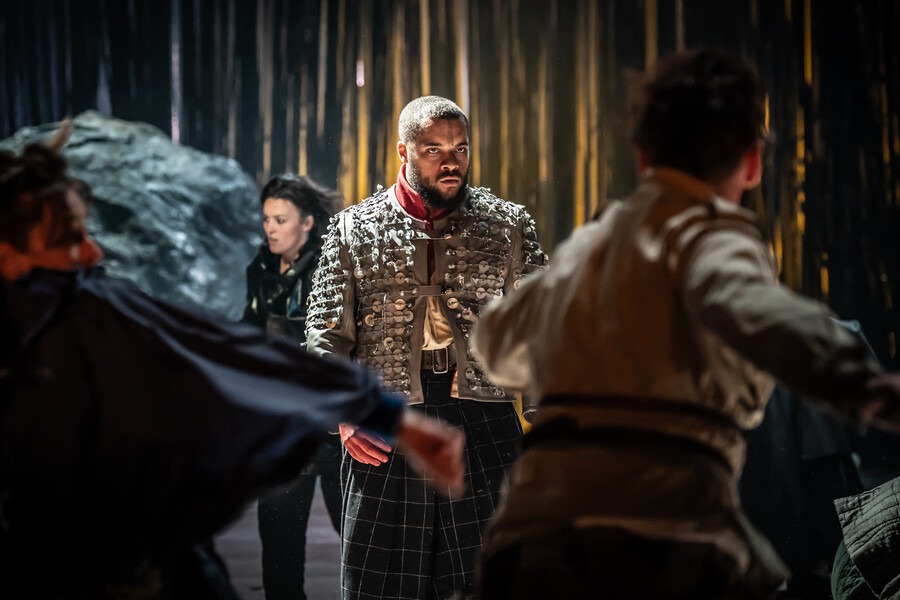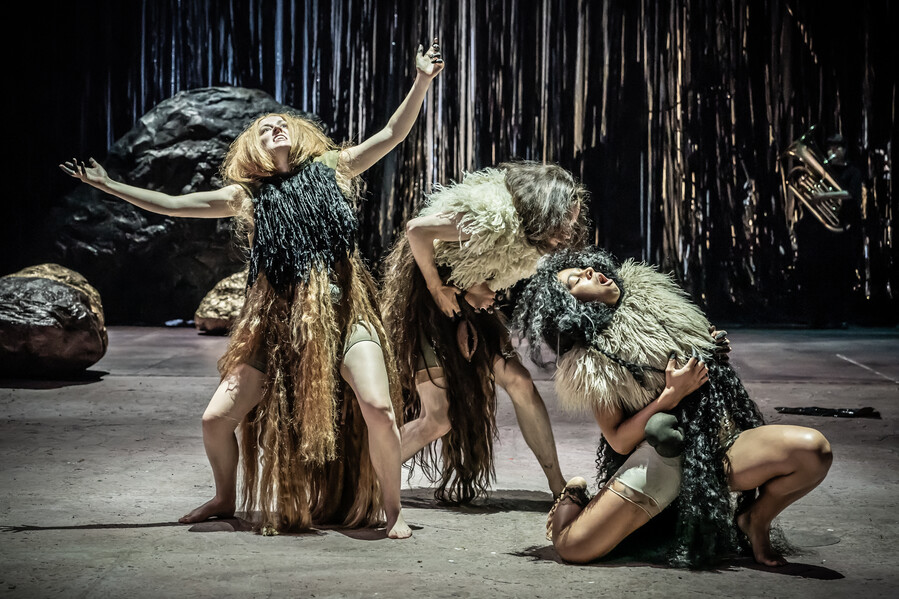
19 August – 14 October
Grey mist and soft rain shroud the playing area. Birds drop from the sky. The ground begins to move, and three creatures emerge, quasi human, quasi demonic, hirsute, jerking, palpably suffering. These witches are terrifying, speaking to our nightmares, likely to unbalance the toughest heart. Their lurking presence throughout gives visual expression to a powerful nether world of ghosts and madness, enhanced by eerie low brass and percussion from the wonderful musicians. And it is this sense of the supernatural, rather than the natural horrors of blood and mortality, that gives strength to this production of the Scottish play, by director Wils Wilson.
At its heart is an extraordinary Lady Macbeth played by Valene Kane. She is both dominating and fragile, drawing our sympathy despite her cruelty. At every entrance, she commands the stage, whether striding forward like a burst of sunlight in her startling yellow dress, or cowering in her nightgown under the weight of unrelievable guilt. It takes a while for her wavering husband to emerge from her shadow. Vulnerable and uncertain at the start, he eventually rises to physical and emotional dominance as he too heads towards breakdown, notably in the great scene in which Banquo’s ghost appears at the dinner table.
Reuben Joseph’s interpretation of Shakespeare’s best-known assassin has pace, energy and versatility, but watching him feels a little like engaging in a spectator sport. The character of Macbeth may excite our loathing, but a great performance should touch something dark inside us. Without this, there can be no tragedy, no catharsis. The absence of grandeur is compounded by the surprising directorial decision to pull down the fourth wall and bring on a microphone for the great ‘Tomorrow, and tomorrow, and tomorrow’ speech, as if the lines were too well known to be delivered from the heart.
On the other hand, the same technique of speaking directly to the audience works brilliantly with The Porter’s scene, notoriously the least successful of all Shakespeare’s attempts to juxtapose terror with humour. The entire speech has been rescripted by comedian Stewart Lee, introducing contemporary resonance and pantomimic belly laughs, and delivered with perfect timing by Alison Peebles.
Other parts are filled with authority and vigour, notably Therese Bradley as Duncan, recast as a gracious and elegant Queen. And Anna Russell-Martin’s Banquo has a wit and engagement often missing from the role.
According to a programme note, the production is set in the ‘near future’. But the costumes have a curiously medieval feel and the destructive effects of personal ambition, and the corrosive effect of political power are universal themes.
Every era has its own approach to Shakespeare. One noticeable trend in contemporary staging is the absence of gore. Gone are the buckets of fake blood that used to splatter our stages. Some may see this as a way of making theatre more palatable, arguing that the visual presence of blood is unnecessary given how vividly it is conjured in the language. Others may feel that cutting the worst of the violence from Shakespearian tragedy, is akin to cutting out the heart. Whatever the line taken, drama needs conflict and needs to be compelling. Here the acrobatic tussles feel slow and forced. We miss the clash of steel on steel.
But there’s more to this tragedy, and this production, than the life and death of a single man. As the play draws to a close, the grey sky clears, a rainbow drifts across the back of the set and we are reminded once more of the forces beyond humanity which speak as powerfully to the twenty first century as they did, albeit in different ways, to the seventeenth.
★★★★☆ Ros Carne 31 August 2023
Photo credit: March Brenner (c) RSC


